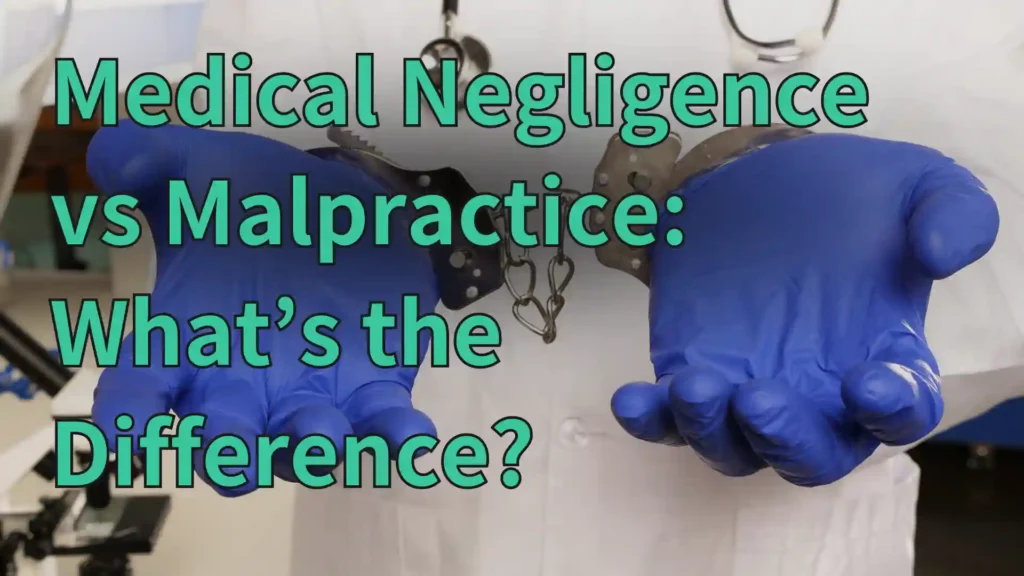
Missouri citizens should be able to seek medical care without fear that their healthcare provider will harm them. Unfortunately, medical negligence happens. The Centers for Disease Control (CDC) estimates that medication errors, preventable infections, and other preventable harms in hospitals take the lives of 400,000 Americans annually. Mistakes in healthcare can have severe consequences for patients and their families. Patients and their families often hear terms like “medical negligence” and “medical malpractice” but may not understand that they are different. It is crucial to differentiate between medical negligence vs malpractice because each has unique legal implications and standards of proof.
A skilled St. Louis medical malpractice attorney at Goldblatt + Singer can assist you or your family if you have been injured due to medical negligence or medical malpractice. Our attorneys can also look at the facts of your case to determine which legal theory best defines your claim.
The essential elements of negligence are the same for medical malpractice and medical negligence.
Medical negligence is when a healthcare professional does not provide the standard level of care expected, and the patient is harmed. This standard of care refers to what a reasonably competent healthcare professional would do under similar circumstances. The standard is based on reasonable medical professionals rather than reasonable people in general. Medical negligence can happen due to:
A crucial aspect of medical negligence is that it doesn’t require intent to harm. Medical negligence focuses on whether the healthcare provider’s actions deviated from the expected standard of care. The central question is whether the healthcare provider was negligent in providing service.
Medical malpractice is a legal term that refers to professional negligence by a healthcare provider that leads to substandard treatment, causing harm, injury, or death to a patient. Medical malpractice has a broader range of errors and often implies a higher degree of fault than medical negligence. It includes:
Intent or recklessness is a consideration for medical malpractice.
The key difference between medical negligence and medical malpractice concerns the degree of fault and intent. Medical negligence is typically unintentional and the result of a lack of proper care or oversight. Medical malpractice involves gross negligence, recklessness, or willful disregard for patient safety. The intent required for this type of claim to succeed is that the professional intentionally performed or failed to perform specific actions that led to harming the patient. Malicious intent is not required, but the professional must have intended not to meet the required standard of care.
Another critical distinction is the legal consequences. Medical malpractice cases require more substantial evidence to prove the healthcare provider’s fault. They typically involve more severe penalties, including significant financial compensation for the injured patient.
Understanding the difference between medical negligence and medical malpractice is vital for patients considering legal action. The burden of proof and evidence required are different for each one. Each type of claim has distinct legal considerations:

Medical negligence could include cases where:
Medical malpractice could include cases where:
If you believe you have been a medical negligence or malpractice victim, it is essential to seek legal advice promptly. Medical negligence and medical malpractice are complicated areas of law and require someone skilled to argue these cases. The lawyers at Goldblatt + Singer have years of experience in similar notable cases. An experienced medical malpractice attorney can help you understand your rights, gather necessary evidence, and navigate the complex legal process.
Understanding the difference between medical negligence and malpractice is crucial for patients navigating the healthcare system and considering legal action. By staying proactive, patients and providers can minimize errors.
If you or a loved one has suffered due to medical negligence or malpractice, seeking legal assistance is crucial to ensure you receive the compensation you deserve. Do not hesitate to call our experienced attorneys at (314) 231-4100 or contact us online. Your health and well-being deserve the highest standard of care and protection. Our law firm can help you get the compensation you deserve.
Constructive Notice vs. Actual Notice in Premises Liability
What Are the Seven Most Common Types of Elder Abuse in St. Louis?